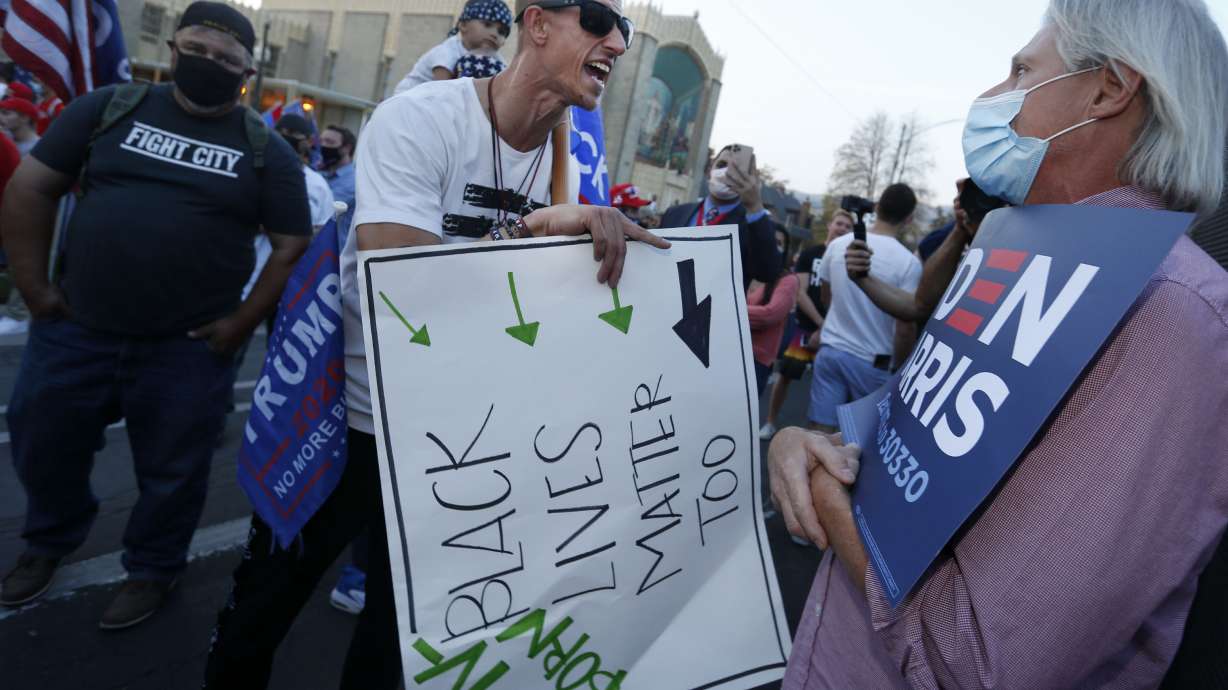Estimated read time: 4-5 minutes
This archived news story is available only for your personal, non-commercial use. Information in the story may be outdated or superseded by additional information. Reading or replaying the story in its archived form does not constitute a republication of the story.
OREM — Utah political leaders often hold up "the Utah way" of doing politics as more civil, collaborative and welcoming. But a recent study found that Utahns are just as divided along partisan lines as people across the country.
The study, conducted by Utah Valley University's Center for Constitutional Studies, surveyed more than 5,000 Americans — including 1,000 Utahns — and found a high level of political animosity in Utah and the U.S., along with an unwillingness to compromise or work with the opposing side.
Researchers also said Utahns were "mixed" on support for democratic norms, although Utahns generally were more supportive of norms than Americans as a whole.
"The research shows how this divide has caused Utahns to be mixed in their support of basic democratic norms," said Jay DeSart, chairman of the school's history and political science department. "While a majority support freedom of speech and the right of peaceful protest, other principles appeared to be more tenuous, such as the rule of law and the necessity of elected leaders to work within the normal limits of rules and procedures."
How Utah Republicans, Democrats feel about each other
Researchers used what they called a "feeling thermometer" to allow respondents to rate how favorably they view different groups of people. Ratings range from 0 to 100, with 100 the most favorable and 0 the least.
The study measured affective partisan polarization, which researchers defined as "negative feelings toward supporters of the opposing party and positive feelings toward co-partisans."
Given the strong conservative lean of the state, Utahns generally preferred Republican voters and elected officials more than the national sample, and gave Democratic voters and elected officials lower marks. People on both sides, however, viewed opposing voters more favorably than they viewed opposing politicians.
"Utah partisans are much less likely to see supporters of the opposite party as open-minded, honest and intelligent, and much more likely to see them as mean, selfish and hypocritical," the research states, noting that the levels of polarization are comparable to what was found at the national level.
Majorities of Democrats in Utah described Republicans as hypocritical, selfish and mean, and fewer than 12% said Republicans are open-minded, honest, generous or intelligent.
The same pattern is true on the Republican side, although slightly more Republicans gave marks for the positive categories, and slightly fewer described Democrats negatively.
Researchers said there is some evidence for a more positive political climate in Utah, thanks in part to leaders who promote "the Utah way" and other positive messaging. They pointed to a 2020 campaign ad released by Gov. Spencer Cox and his Democratic rival Chris Peterson as having an impact on how Utahns view the other side.
But they said national political leaders also have a huge impact on affective polarization, so Utah likely isn't immune from an increasingly polarized nation.
'Significant minority' open to dictatorship?
Utahns are largely in favor of constitutional checks and balances, but other norms received less support. Only 53% of Utahns said people should be allowed to vote even if they're misinformed, and 49% said they would oppose a strong leader who bends the rules to get things done.
"While encouraging that Utahns are less inclined than the rest of the country to support extraconstitutional means for accomplishing the work of the people, (these results are) still of great concern," said Robert Burton, director of UVU's Civic Thought and Leadership Initiative. "An elected official could use it as justification to overstep the authority granted them by the people."
Even smaller minorities of Utahns said the ends don't justify politicians' methods and they would oppose a leader bypassing normal processes. A meager 33% said they support the value of compromise.
One out of eight Utahns said military rule is a good idea, and a quarter agreed that the U.S. would benefit from a "strong leader who does not have to bother with Congress and elections."
While these aren't close to a majority, researchers noted that "a significant minority seemed to be open to some form of dictatorship."
"These findings press home the importance of constitutionally grounded education and the cultivation of civic virtue among Utahns," said Matthew Brogdon, senior director of the Center for Constitutional Studies.
He noted that George Washington in his farewell address warned of putting party loyalty over constitutional liberties.
"When Americans, and especially Utahns, are inclined to lay aside constitutional protections in support of their own partisan aims, the cause of republican self-government suffers," Brogdon said. "This demonstrates an urgent need to increase constitutional literacy among ordinary citizens, as well as those in power, to sustain our constitutional republic."









